WHAT’S INSIDE A FACTORY SUPERCROSS CONTRACT
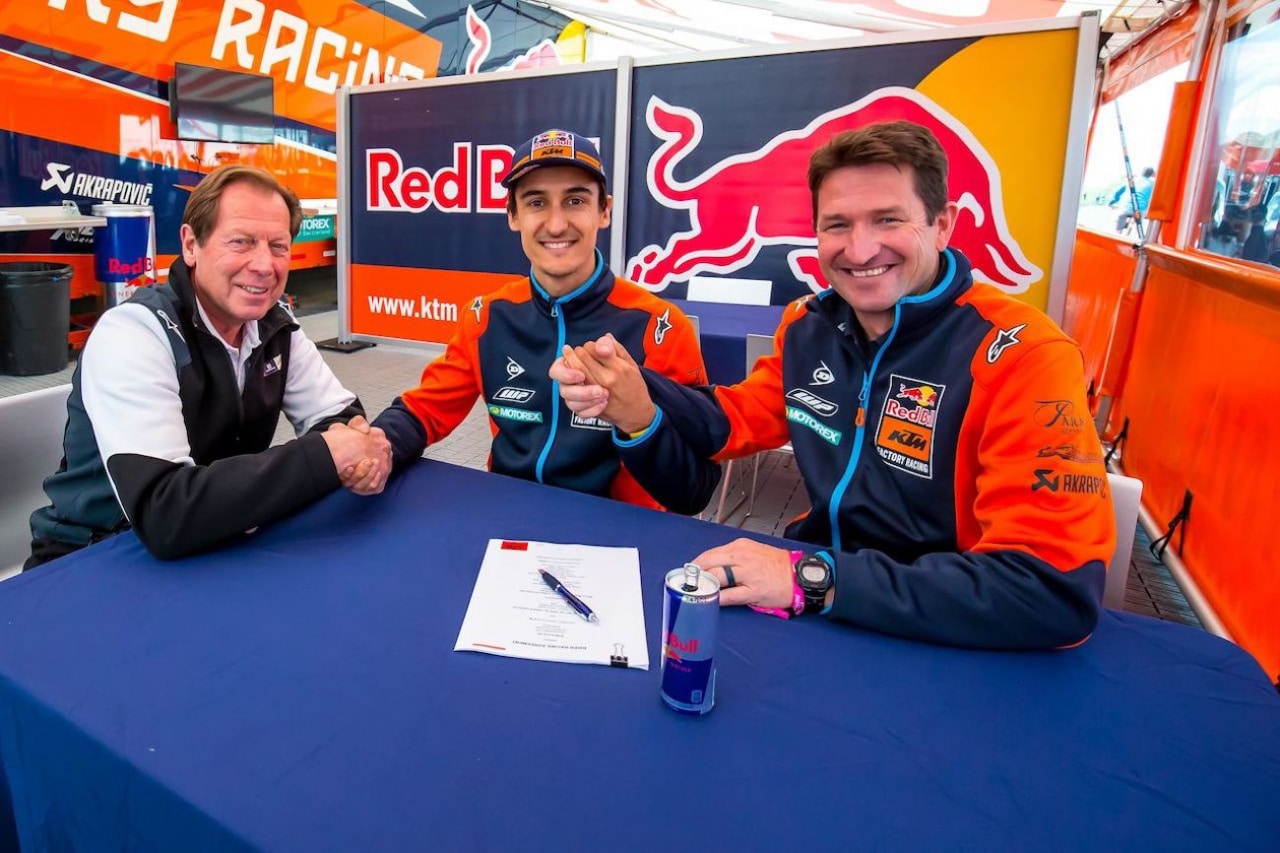 Roger DeCoster (left), Marvin Musquin (middle) and Ian Harrison at the classic photo op of the contract signing. Marvin signed a Supercross-only deal for 2022.
Roger DeCoster (left), Marvin Musquin (middle) and Ian Harrison at the classic photo op of the contract signing. Marvin signed a Supercross-only deal for 2022.
INSIDE FACTORY SUPERCROSS & MOTOCROSS CONTRACTS
Imagine this! You have an incredible run of luck. Every race you enter, you win. You move from the 250 Novice class to the 250 Pro class in six weeks. On a lark, you sign up for a big regional race and smoke the hotshots. Your buddies talk you into getting an AMA Pro license and drive you to the next Supercross. You make the main, finish third behind Ken Roczen and Eli Tomac and are suddenly swamped with contract offers.
Every team wants you to sign on the dotted line, but what are you signing? Don’t worry, the MXA wrecking crew is going to take you into the ultra-secret world of factory contracts. We are going to reveal, for the first time, the clauses, conditions and amendments that bind riders to their teams. These are the innermost secrets of the factory riders and the teams they ride for.
RIDER’S OBLIGATIONS
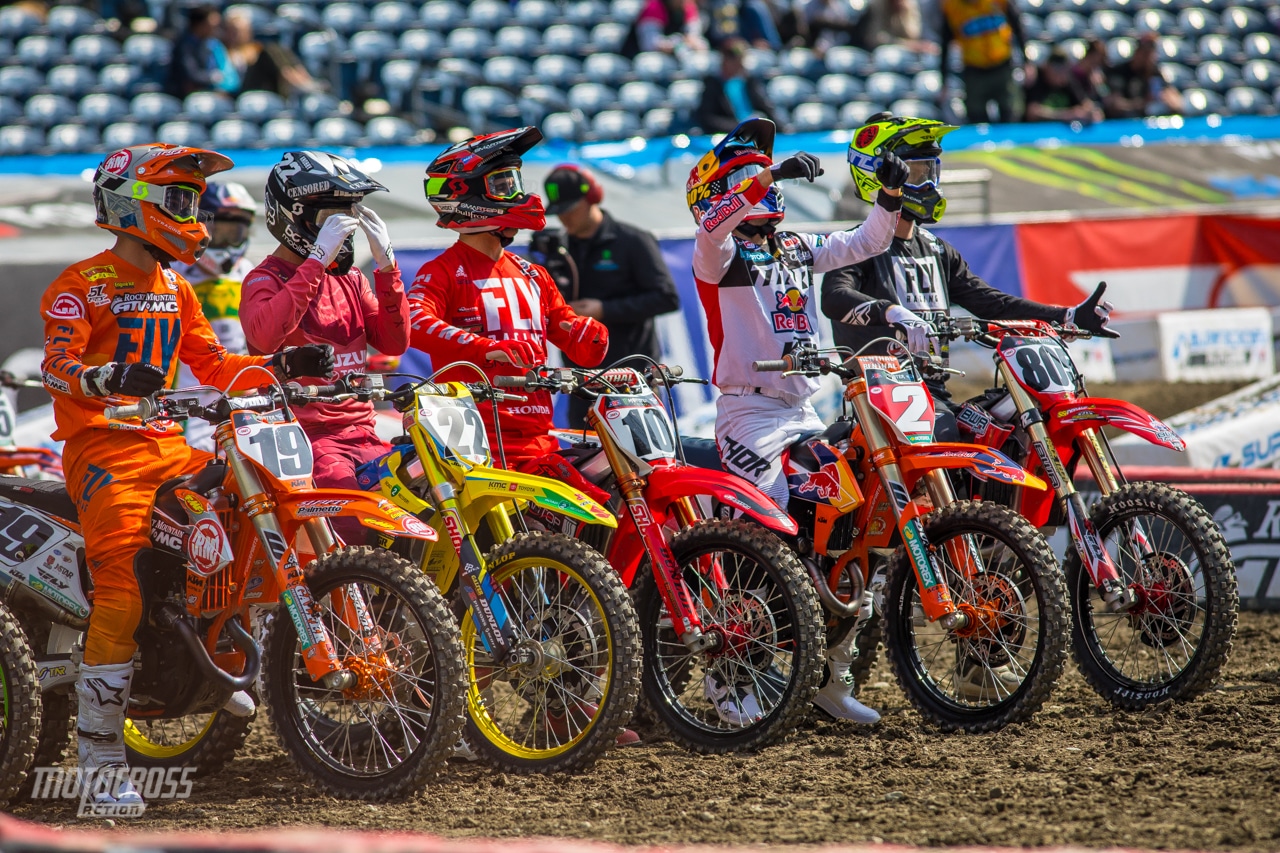
Contracts have lots of sections, subsections and amendments, but when boiled down to the basics, these are the assigned obligations of the rider.
1. The rider shall ride the team’s brand of motorcycle in the agreed-upon schedule of events (typically the AMA Supercross series and AMA Nationals, plus three other events to be named later).
2. The rider shall ride to win, but if he’s not in position to win a championship, he will ride to benefit any other team member who is in position to win a championship. That means moving over for your teammate (which is illegal under AMA rules).
3. The rider shall keep himself in top physical condition. Should the team question the rider’s physical or mental condition, the rider must submit to an appropriate examination (the team will pay the doctor bills). Failure to take the medical exam is grounds for termination.
4. The rider is required to submit to a drug test with 48 hours notice. The test can include blood and urine samples, but is not limited to those.
5. The rider shall, at all times, conduct himself according to the highest standards of good sportsmanship, social convention, moral conduct and maintain reasonable grooming standards.
6. The rider shall wear apparel approved or provided by the team at all races and personal appearances. Any outside apparel contracts not approved by the team will be considered null and void. Apparel means head-to-toe. All approved clothing will be listed at the start of the season in a contract amendment.
7. The team has sole control of endorsements, sponsorship or licensing of the rider’s name, photograph, signature, likeness, voice and personal characteristics. The team’s ownership takes precedence over any other sponsorship/endorsement/licensing contract.
8. The rider shall not directly or indirectly endorse any product that is in competition with a product promoted or sold by the team. This includes ATVs, motor scooters, personal watercraft, motorcycles, accessories, parts or options sold by the team. (While at Team Honda, Jeremy McGrath appeared in a photo in Jet Ski magazine riding a Yamaha Wave Runner and got in trouble.)
9. The rider will work as an independent test rider in the development of the team’s production and racing motorcycles. Testing will be limited to three days a week (the team promises to give the rider two weeks notice before the testing date).
10. The rider will make himself available to promote the team’s bikes, product line and services for up to 35 days per year. This can include public relations, autograph signing, dealer shows and pre-production work.
WHAT THE FACTORY MUST DO

A factory contract is an agreement in which each signee (rider and team) must do their part. What part does the factory play? This is what the contract states the factory must do.
1. The team will pay the rider the agreed-upon amounts.
2. The rider will be allowed to keep any and all prize money.
3. The team agrees to make every effort to provide the rider with a competitive motorcycle.
4. The team will furnish a professional mechanic to maintain and transport the motorcycle to scheduled events. In many cases, the rider can name his own mechanic.
5. The team is not required to provide race support at events not on the agreed-upon schedule of events. The team doesn’t want to have to send its semi-truck, mechanic and works bike to a podunk race in the middle of winter.
6. The team has control over the rider’s time, at least to the extent required to fulfill all public relations, testing and racing obligations.
KEEPING EVERYTHING SECRET

Factories are big on secrecy. They don’t want any of their future plans leaked to the competition (and that includes the details of their contracts). To insure that there are no leaks, a factory rider must sign a confidentiality agreement.
1. All new ideas, concepts, inventions, modifications and developments are the sole property of the team. The rider cannot start a business after retirement with the team’s secret ideas.
2. The rider shall assist the team in obtaining any copyrights, trademarks or patents by executing all documents requested by the team.
3. The rider shall not disclose the contents or information contained in his contract to anyone outside of the team and his own agent without written consent.
WHO OWNS WHOM?
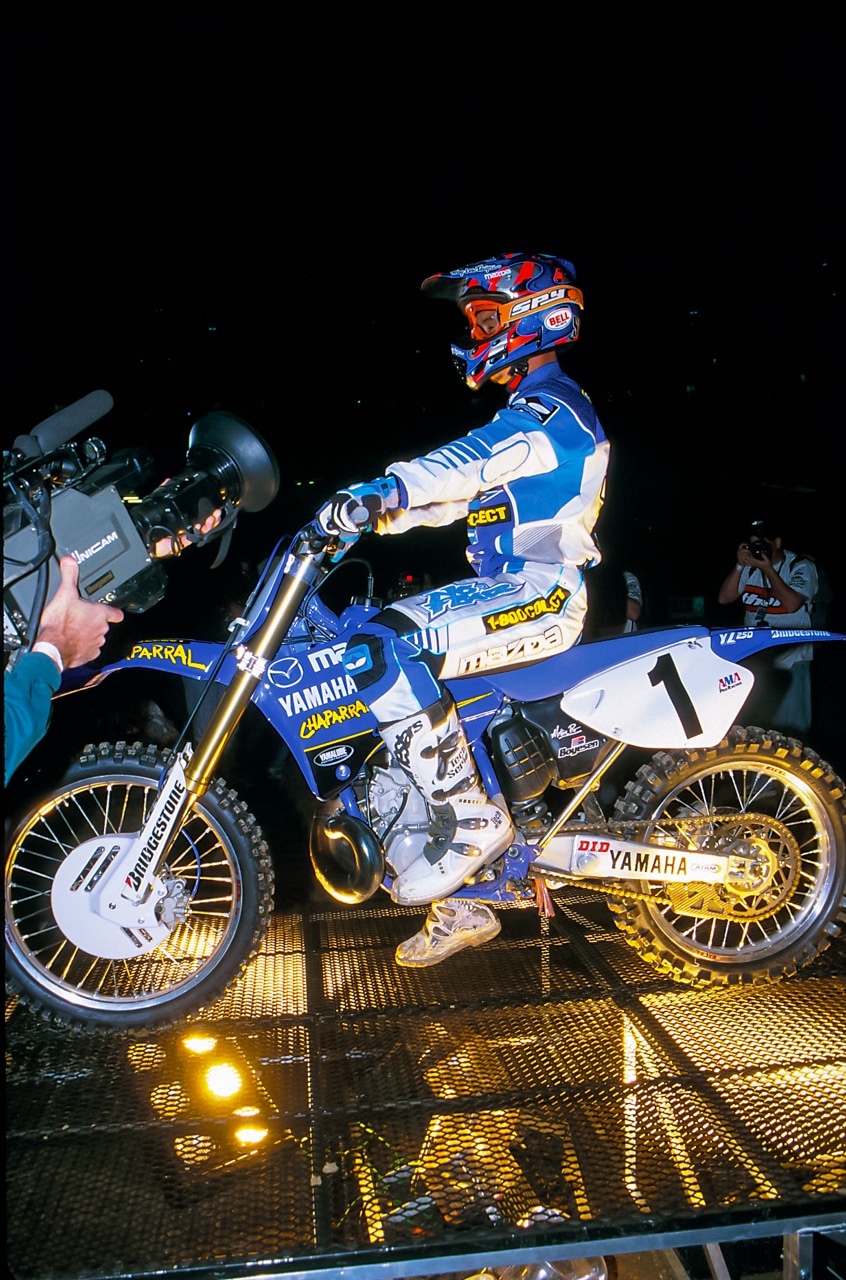
One of the reasons Jeremy McGrath broke away from the factory team system was to gain control over his name, image, likeness and sources of income. Those who stay with the factory teams have to give up the rights to their name.
1. The rider must agree that all depictions or expressions in any form or medium are the property of the team.
2. The rider agrees to allow the team to use his name and likeness to sell, promote, distribute, advertise or license any team product.
3. The team does not need the rider’s consent to use his image or likeness and the rider waives any rights to royalties or residual monies (and the rider must cooperate fully with the team). Additionally, these rights shall survive the termination of the contract.
4. The rider shall not sign any promotional, contingency, sponsorship or licensing agreement without the approval of the team. Any contracts that the rider enters into that are inconsistent with the team’s will be considered void.
ALL THE LEGAL MUMBO-JUMBO
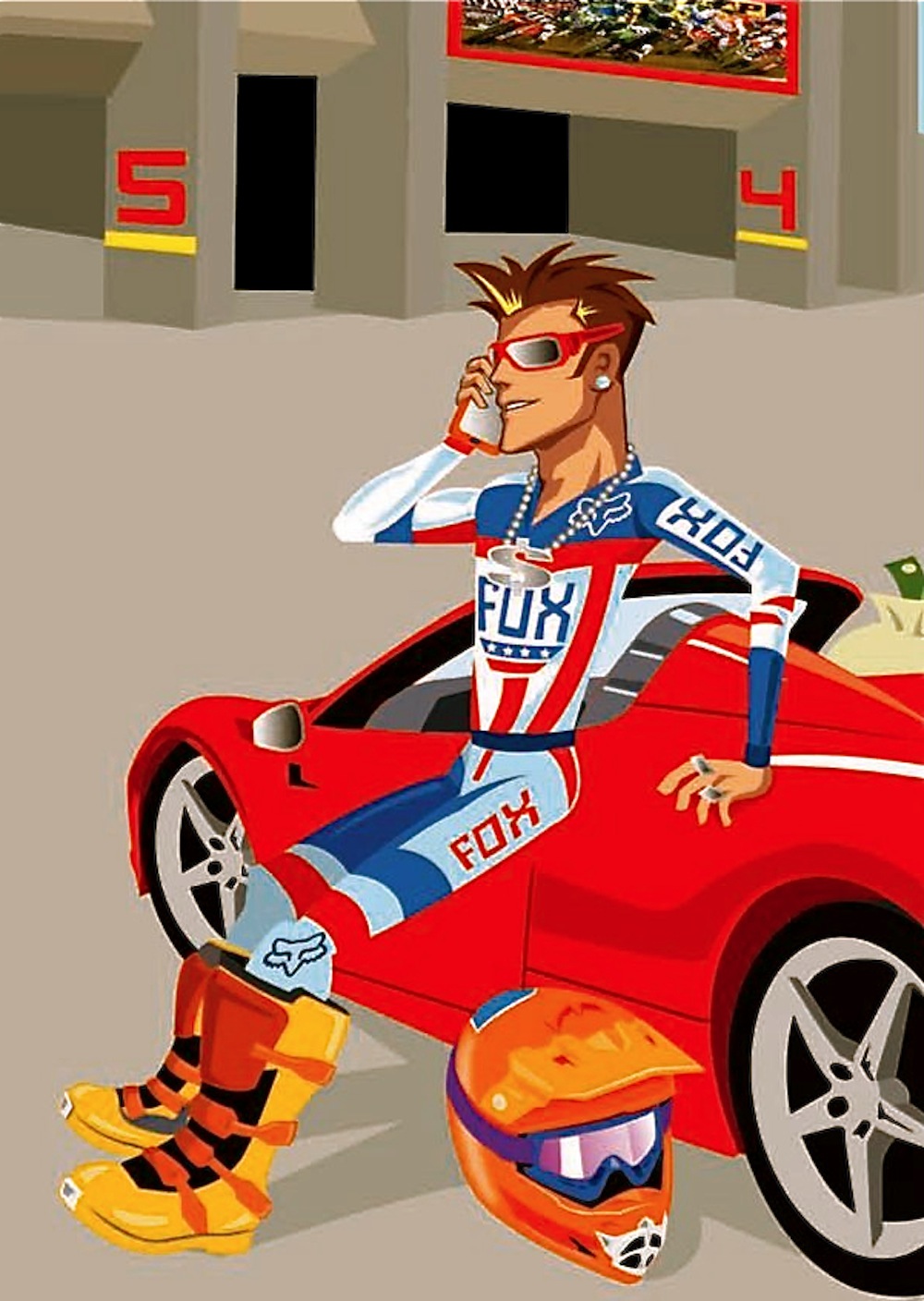
We live in a litigious society. The factory teams don’t want to get sued by anyone. If they had their druthers, they would prefer that the rider get sued. The typical factory contract covers the factory teams’ liability.
1. The rider, for himself, his heirs and legal representatives, releases the team from any claims or liabilities for property damage, personal injury or death that the rider may incur while riding for the team.
2. The rider agrees to indemnify the team against any suits, compensation claims or liabilities related to the riders’ actions.
3. The rider agrees to maintain his own health and accident insurance (including general commercial liability coverage) during the term of the contract.
4. The team will not provide medical insurance, emergency room care or workman’s compensation for the rider.
5. The rider admits that he is familiar with the risks, dangers, hazards and perils of preparation for and participation in : (1) scheduled events, (2) non-scheduled events, (3) promotional events, (4) personal activities and (5) the use of motorized vehicles.
6. The rider is an independent contractor and is at no time to be considered an employee of the team. The contract does not constitute a partnership between the rider and the team.
CAN THE FACTORY SUPERCROSS TEAMS FIRE YOU?
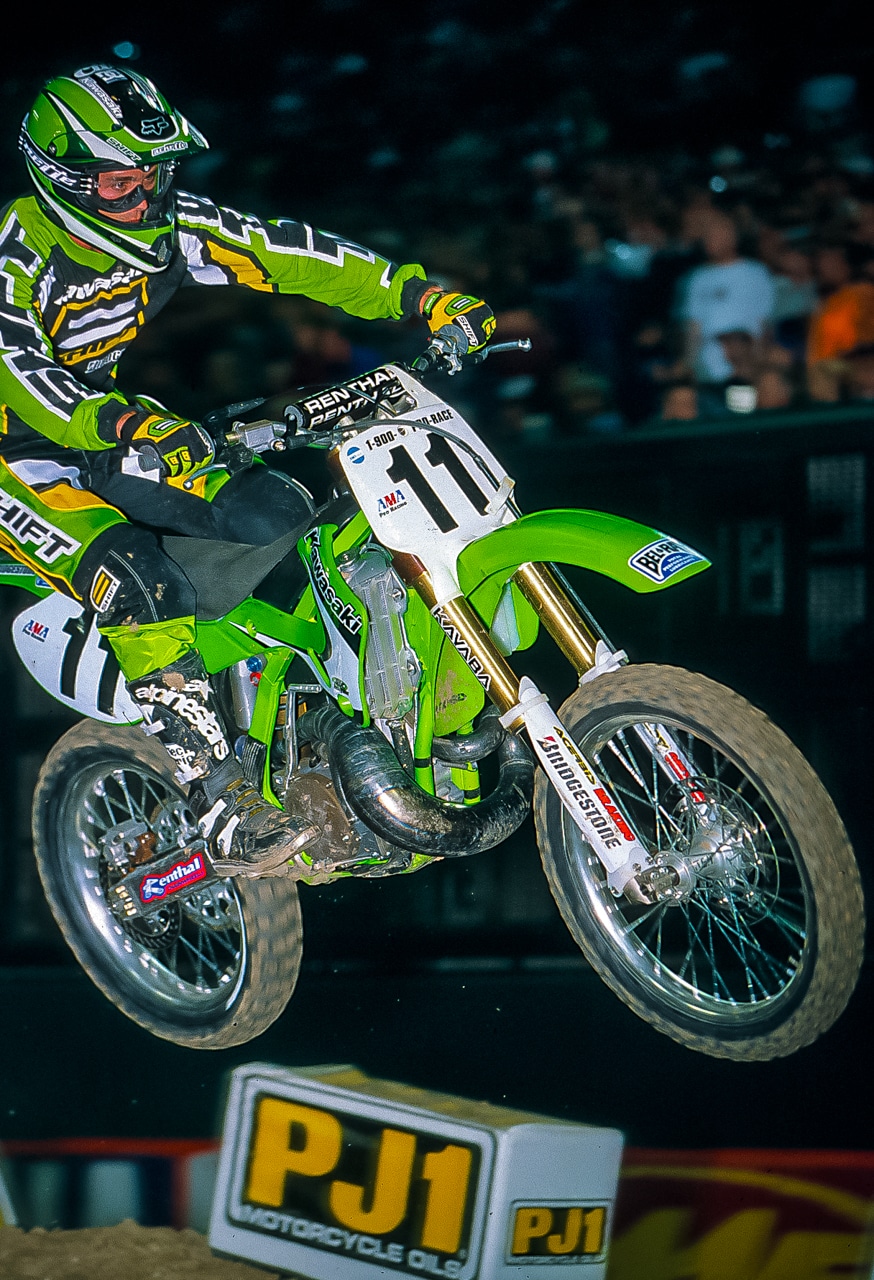 Jeff Emig got fired from his factory Kawasaki contract after being in the possession of marijuana.
Jeff Emig got fired from his factory Kawasaki contract after being in the possession of marijuana.
If you are a winning, you can get away with anything, but if you aren’t a winner, this is the part of the contract that you need to read carefully. Factory riders can be fired.
1. The rider can be terminated with five days notice for breaching the contract, failing to participate in scheduled events (without just cause) or being convicted of involvement in a felony (or the violation of any law involving an act of moral turpitude or an act that reflects negatively on the team).
2. The rider will have 30 days to cure any breaches of contract, but there is no grace period for violations of the law.
3. The contract will be terminated at the end of any calendar year in which the rider dies.
4. If the rider is injured to the extent that he cannot compete, the contract will be terminated if the rider cannot start the next season’s events.
5. If the rider is fired for any of the above breaches, he will not be paid past the date of termination.
6. If the rider breaches his contract, he can be sued by the team for injunctive relief including legal fees. (Kevin Windham has sued for breach of his disputed ’99 Yamaha contract).
7. In the case of any suit arising out of any clause in the contract, the party that loses shall pay the legal fees of the party who wins.
8. Should the rider breach any term of his contract (including basic obligations, confidentiality, loan of motorcycles, property rights, schedule of events or public appearances), he is subject to monetary fines of up to $25,000 per instance of non-compliance. It should be noted that Honda fines a rider $25,000 for an infraction, but Yamaha’s top fine is only $3000. It is rumored that when Ron Lechien was a Kawasaki factory rider, he was fined more than any rider in history for failing to show up at test sessions.
DO YOU GET TO KEEP THE FACTORY SUPERCROSS BIKES?
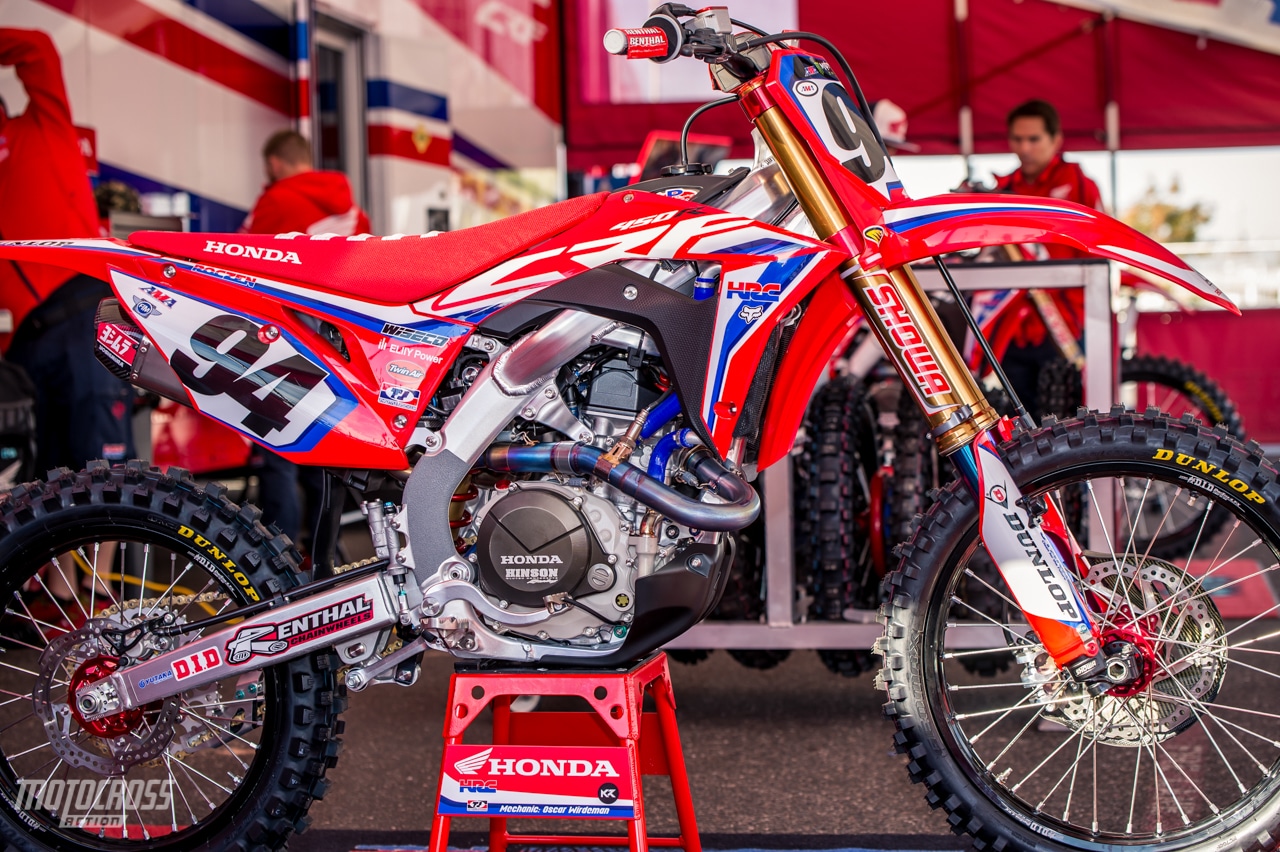 Ken Roczen‘s Factory Honda CRF450.
Ken Roczen‘s Factory Honda CRF450.
Factory riders don’t get to keep their full-on race bikes. In actuality, they have very little access to their race bikes. Factory teams keep total control over the bike that the rider races in the Nationals and Supercrosses, but the rider does get a practice bike (normally as many practice bikes as he technically needs to make it through a season).
1. The team agrees to provide race motorcycles for the rider to use at the agreed-upon schedule of events.
Additionally, the team will give the rider, through the transfer of title, a practice motorcycle and as many spare parts as are deemed necessary by the team to keep the practice bike working.
2. The rider will not ride, drive or operate his motorcycle in any race not on the agreed-upon schedule of events (unless the team agrees).
3. The rider will never loan his bike to any other rider.
4. The rider will only ride his bike on racetracks or testing areas (unless it is street legal).
5. At the end of each race on the schedule of events, the rider will give his race bike to the team. If the rider does not give his motorcycle back to the team at the conclusion of the race, his salary can be withheld until the bike is returned.
HOW IS THE MONEY PAID?
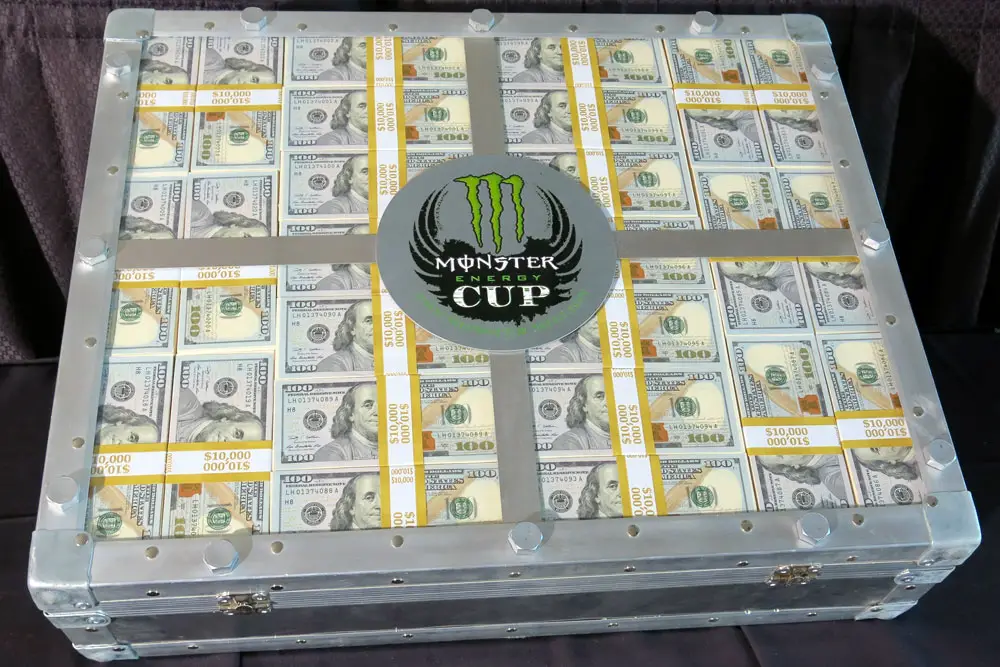 The Monster Million.
The Monster Million.
Money makes the world go round. Here is how a factory rider gets his dough. If you’d like to know how much money that is and how it is dispersed, refer to the May 1999 issue of MXA for the article on Kevin Windham’s ?99 contract dispute.
1. The rider’s salary (also known as base compensation) is paid in 12 equal installments at the end of each month. Most big-name factory riders have monthly salaries (before taxes) in the $20,000 to $100,000 range.
2. The rider’s bonuses (for wins and championships) will be paid upon the filing of the race report.
3. The rider will be reimbursed for travel arrangements only if he submits supporting documents (receipts) and a race report within 30 days of the travel date.
4. The rider will only be reimbursed for Coach airfare. Some teams limit airfare to $985 per race.
5. Most teams give the rider a lump sum to cover car rental for the complete season. The amount varies from $2500 to $5000.


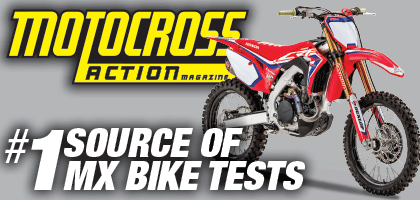

Comments are closed.